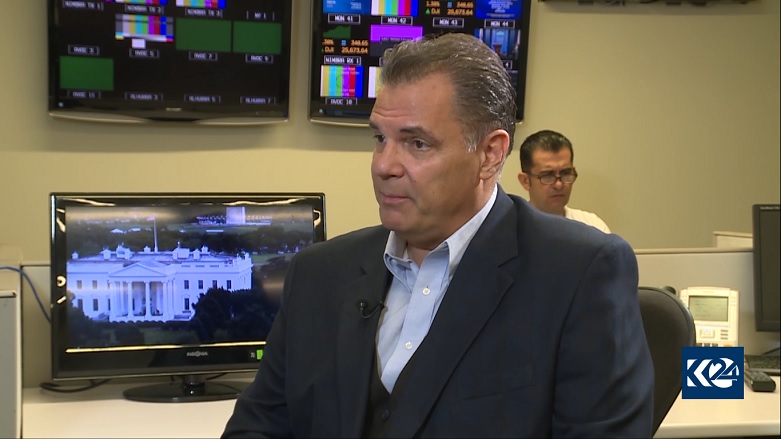Stephen Mansfield: Every Kurd is a representative of the Kurds

WASHINGTON DC (Kurdistan 24) - Stephen Mansfield is a best-selling American author, renowned speaker, and great friend of the Kurds. He is also from Nashville, Tennessee, home of America’s largest Kurdish community, and he has become a powerful and eloquent spokesman on their behalf.
HOW STEPHEN MANSFIELD LOST HIS HEART TO THE KURDISH CAUSE
Earlier this week, Mansfield spoke with Kurdistan 24, explaining that it was actually through Nashville that he became familiar with the Kurds, their plight, and their issues.
“In the 1990s, the Kurds began to pour into Nashville,” Mansfield said. “I befriended them, got to know them, helped some organizations that worked with them” and “lost my heart to the Kurdish cause.” In the decades since, Mansfield has travelled to Kurdistan many times, pretty much once a year.
He has just returned from California, where he made a speech about the Kurds, while he regularly discusses Kurdish issues on Capitol Hill. “Not as an official lobbyist,” Mansfield explained, “but I do my informal lobbying over lunch with as many power brokers as I can.”
“One of the wonderful things about the Kurdish cause, here in the US,” he remarked, “is that it’s a bipartisan cause”—unusual these days, as the political scene is highly polarized.
“Some of the strongest advocates for the Kurdish cause are outspoken, leading Democrats,” he said, while “many of the leading advocates for the Kurdish cause are outspoken, leading Republicans.”
HOW THE KURDISH DIASPORA CAN HELP
Many communities—Greeks, Jews, and Armenians, for example—help their homelands by their activities here in the US, Kurdistan 24 observed, asking “What can Kurds in America do?”
Mansfield responded by noting what he called the huge “information gap” or “knowledge gap” between “the Kurdish reality” and the average American.
“Curds” are a breakfast food in the US, Stephens said, and he remarked that he is often asked, “Why are you talking about a breakfast food?”
“Every Kurd living in the US, in fact, every Kurd in the world needs to see themselves as part of the public relations effort,” he explained.
There are “many things that can be done,” Mansfield said, as he offered some examples. Writing is certainly one, including for local newspapers, as well as being active on social media.
“It’s wonderful to invite people to Kurdish cultural events,” he continued. “I’ve been invited many times, and I love it.”
“Kurds have to get into the American system,” he advised. “I’ve recommended in some communities that they offer awards to the politician who most represents their cause.” One idea: “Have an annual award: the Kurdish Friendship Award,” or whatever you might want to call it.
“I tell every Kurd, everywhere in the world” that it is important to “represent your people.” The knowledge gap hurts the Kurdish cause, “but it’s not going to be closed by anybody other than the Kurds.”
MOVING FORWARD AFTER ISIS’ TERRITORIAL DEFEAT
The “Kurds have had distraction after distraction after distraction” slowing the economic development of the Kurdistan Region, Mansfield explained. But “I’m hoping now,” especially with the recent political arrangements, that “real progress” can be renewed.
Before 2014, “there was wonderful promise of construction” in the Kurdistan Region, “and new deals and funds” coming from overseas, along with multinational firms, “but all that got stalled by the assault of ISIS.”
“I’m hoping now that we can really move forward,” he continued, “both in the Middle East, but also here in the US.”
Mansfield’s description of the economic development of the Kurdistan Region echoed that of Sen. Tammy Duckworth (D, Illinois), a US Army veteran, who flew a helicopter during Operation Iraqi Freedom (OIF), before being seriously injured in 2004, when her helicopter was shot down.
Read More: Sen. Duckworth: Kurdistan is model for Iraq; ISIS not defeated
“When I used to go up to the Kurdish Region, there was one fancy hotel on top of a hill and that was it,” she told a Washington audience last week, as she recalled Erbil in the early days of OIF. “We landed on a hillside and parked our helicopters and walked up to the one hotel.”
Now, there are “high-rises, it’s gleaming, it’s modern”—in sum, “an international cosmopolitan city,” she said.
THE MIRACLE OF THE KURDS
As Mansfield is a best-selling author, with a strong concern for and interest in the Kurdish cause, it was, perhaps, inevitable that he would write a book about the Kurds, and he did: The Miracle of the Kurds.

Mansfield explained that the story of the Kurds struck him as miraculous in several respects.
“I think it was a miracle that they survived,” he said. And it was a miracle that they emerged form their travails “in the condition of heart that they were.”
“I didn’t find them to be bitter,” and “I didn’t find them to be anti-West, even though they’d been betrayed by many Western powers.”
Moreover, the Kurds are “moderate Muslims, in the belly of the Middle East.” Many are “pro-Israel, an unusual mixture of people, very hospitable and gracious, and so I found their whole existence to be a miracle,” he said.
Mansfield is, again, leaving on a trip to Kurdistan, where he will work to help attach an American University, and discuss with Kurdish officials the religious liberty clauses in the new constitution.
